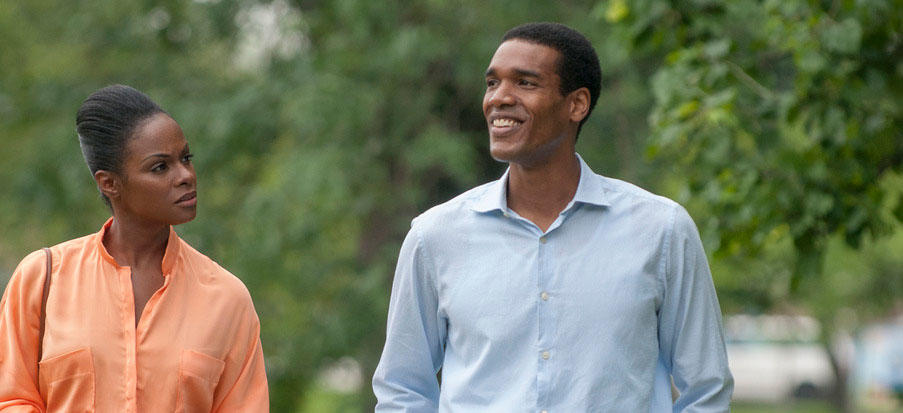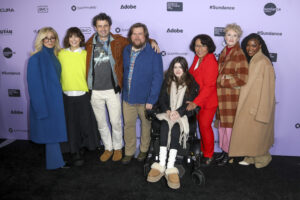Tika Sumpter and Parker Sawyers in ‘Southside With You’
Jeremy Kinser
First dates can be awkward, but they often make for fascinating cinema. In the tradition of Richard Linklater’s Before Sunrise and Andrew Haigh’s Weekend, Southside With You follows two young people getting to know one another as audiences get a chance to learn about them.
What distinguishes writer-director Richard Tanne’s first feature from the pack is the protagonists here are 26-year-old attorney Michelle Robinson (Tika Sumpter), who is rather reluctantly squired around Chicago one summer afternoon with her firm’s new associate, 28-year-old Barack Obama (Parker Sawyers).
Tanne spoke with Sundance about how he cast actors to portray the future first couple, the challenges in making a film about public figures, and whether the Obamas are aware he’s made a movie about them.
This is the first feature film you’ve directed, and besides it being a very assured piece of work, it’s fairly audacious to make a romantic movie about the sitting president. How did the film come together?
I wrote the script on spec. The response was very positive right off the bat. I had no idea how people would respond to it. You never do. But in particular this being a movie about the president, I didn’t know how it would land. On the other hand, I didn’t really think too hard about it.
It never felt like I was working on a movie about President Obama or first lady Michelle Obama. It felt like I was writing a movie about 28-year-old Barry Obama and 26-year-old Michelle Robinson. Tika Sumpter read my very short outline for the script. A mutual friend had given her this tonal perspective thing I had written about what the movie was going to be. Before I even went off to write it she wanted to meet and she expressed her desire to play Michelle and help get the movie made.
That must have been encouraging since you hadn’t even written the script yet.
She really blew me away. I said “Let me go write the script and see if you’re still interested.” Some months later I did and she was still interested so we teamed up to get it made. Aside from giving what I think is a really beautiful and complex performance, she backed me as a first-time director and was instrumental in finding the financing.
It was a process of almost exactly two years from finishing the script to finishing principal photography. About a year-and-a-half of that was Tika and I hitting the ground running, taking meetings, trying to get the money together and put the right team together.
What was the source material for your research?
My research was primarily reading everything I could get my hands on in the public domain – mostly articles and interviews. I tried to stay as far away as possible from anything in their lives that happened after the summer of 1989, when their first date took place.

Parker Sawyers and Tika Sumpter star as a young Barack and Michelle Obama in ‘Southside with You.’
What was it about their date that made you think it had movie potential?
Michelle wasn’t interested at first and Barack had to win her over. By the end of the day he’d done just that and it felt like a movie to me. I think it caught my attention because there’s something special about the way Barack and Michelle look at each other. To me, their connection feels real and authentic and vibrant and a little sexy. T
he fact that they’re the president and the first lady makes that dynamic all the more interesting. Looking at their first date was a way to see how something like that begins. It was a way to explore the spark and all the moments that break down our defenses and walls and allow us to really connect with someone else. I was excited about tracking all of those little moments in between that could really forge a strong connection between two people.
How much of what we see in the film is factual and how much is creative license you exercised?
A lot of it is based on fact. They went to many of the same locations and did many of the activities on that first date. Mostly all of the biographical details that are talked about or portrayed are based on fact. However, where I had to take creative license was “did they talk about those things on their first date?” or “were those issues still prevalent in their lives at that time and is that what they were thinking about or dealing with?” Of course I wasn’t there. No one was there. I had to learn as much as possible about them and extrapolate from there. That’s what I tried to do.
Did the events actually transpire just as they’re depicted in the film?
Many of them did. To the degree that where I didn’t know what happened I had to fill in the blanks. Again, many of the activities they’re engaged in and the places they went to they did go to on that first date. One example of creative license is I had read accounts of their early courtship from one or both of them and they both mentioned going to a community organizing meeting at some point. In one interview it was on their first date but in another interview it was sometime early in their courtship. I think I read enough to know that the organizing meeting wasn’t their first date but I liked what it could do for us dramatically by bringing them there. So I felt that it was a part of their early dating it wasn’t too much of a cheat.
Did you speak to people who knew the Obamas during the time depicted in the film?
Yes and no. Not during the writing process. During the writing process it was about researching them and listening to their stories. Once we got to Chicago, what’s interesting about Chicago is that everyone and their mother has a Barack or Michelle story. I don’t mean to sound glib, but they were very, very plugged-in in Chicago and touched a lot of lives while they were there.
In particular we shot at Altgeld Gardens, it’s the southern most tip of Chicago and is the former projects but it’s now a low-income housing community. It’s actually where Barack organized prior to going to Harvard Law School. In the movie he takes Michelle back there and there’s a community event they go to. We actually went there and shot. All of the residents were there over 20 years ago when Barack was there so they all knew him and had had experiences with him. It was fantastic to capture people who had orbited the Obamas.
As a young white filmmaker, how did the Obamas’ story personally resonate with you?
I wanted to tell a love story. I was only looking to tell the story of their first date. It wasn’t until a few years after the idea of a first date movie occurred to me that I understood how to approach it. I think it wasn’t until I fell in love myself that I understood.
It wasn’t a movie about falling in love. It was a movie about finding that person who can make you better, the person who can hold up a mirror and show you who you have the potential to be. That’s Barack and Michelle. That’s when it really clicked for me that I had something to say about this story and I knew how to say it.
As far as race, I wanted to tell a love story first and foremost but it was based on real people and it’s important to try to accurately portray who they are. Issues of race are of great importance to both Barack and Michelle their entire lives. Not just their racial identities but America’s. It was really wonderful and educational to embrace the cultural nuances and to do so under the pretense of a love story.
The success of a film like this is absolutely dependent on casting the right actors. You mentioned how Tika Sumpter came to play Michelle, but how did you find Parker Sawyers?
Parker’s casting came about in a more traditional way. He was one of 10 or 15 actors who auditioned. It wasn’t a big net we cast. We did our homework and zoned in on some very talented emerging actors. Parker was actually not on the radar. He was on the roster for an agent who represented another actor we were looking at. He really came out of left field when his tape came in.
The physical resemblance and the mannerisms were uncanny. I was actually very put off by his first tape, because he was doing a straight impersonation of President Obama. To be fair, a lot of the actors were having a hard time of letting go of the guy we see on TV every night. Parker’s impersonation was spot-on, but it was still an impersonation, nonetheless. I was looking for someone to play the character on the page, not the person they see on TV. Fortunately, our casting director “Twinkie” Bird suggested that I give Parker’s tape another look and imagine what it would be like if he dropped the impersonation.
She thought there was something there. I watched it again and she was right. I saw what she was talking about. There was a lot going on behind the eyes. I called Parker and gave him some notes. As soon as I told him “Get the president out of your mind. You’re just a guy trying to get a date with this girl,” it clicked for him. The next day the new video came in and it was off the charts. I remember thinking, “OK, I think we can go make this movie now.”
What are some of the challenges in directing actors as real-life people who are as familiar to audiences as the Obamas?
There weren’t any challenges directing Parker and Tika. I have to be completely honest. From the time they came on, the three of us were in total alignment about how to approach their interpretations. We didn’t want them watching the news or interviews from the ‘90s or 2000s. We didn’t want them thinking or speaking the way that they do now. We approached it that the idea was to educate yourselves about their lives and base your performances off their experiences up until that point in 1989.
That kept things true and pure and grounded. I have to say that the reason that I asked Tika and Parker is that both of them, without having to try, already possess similar qualities or traits. A lot of the challenge was removed from the start by having actors who radiate some of those qualities. If they’re there and come from within, the actors aren’t searching or forcing. For me it was just rehearsing with them like it was a stage play. I made it clear to everyone that we’d be doing long takes and they had to be able to perform the script from start to finish as if they were doing a play every day. They showed up to rehearsals off book and were absolutely wonderful. They were both immersed in their characters the entire time.
How difficult is it to make a period film that’s set in a time that people still remember and can check for authenticity?
We didn’t have a tremendous amount of money to recreate the time period so we focused on the smaller details that would instantaneously evoke recognition of a time period. We couldn’t have crane shots of the bustling city, but we did try to get the smaller details within our control right. For example, in the opening credits there are various shots of Barack driving from his part of the city to Michelle’s neighborhood to pick her up for the date and it’s shot from the perspective of his car. All of the music is from 1989 or before. The fabrics that our production designer chose are all authentic.
What do you think audiences will be most surprised to learn from the film?
I don’t know. I can say that I was most surprised to learn that they were experiencing things that all of us go through. This moment where they came together seems to be that time in a young person’s life where you’re hitting the benchmark steps society expects of you but now you start asking yourself, “What do I expect of myself?” I tried to make this movie about that moment for the Obamas, where they each had personal turning points and help each other along. That was surprising to learn that they were just like everybody else.
Do you know if the Obamas are aware of your film?
Yes, they’re definitely aware of it. From what I’ve heard they are excited to see it and they are also, I think rightfully, a little baffled by its existence. I should stress that I’ve only heard this through second-hand sources. I have no personal connection to them whatsoever so I don’t want to speak on their behalf…except to make a movie about their lives.
Do you hope to screen it for them?
I’d love for them to see it, of course. The logistics of that are out of my hands. My hope is that they will see it and will find something to appreciate about it.




